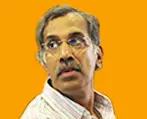
- Home
- India
- World
- Premium
- THE FEDERAL SPECIAL
- Analysis
- States
- Perspective
- Videos
- Sports
- Education
- Entertainment
- Elections
- Features
- Health
- Business
- Series
- In memoriam: Sheikh Mujibur Rahman
- Bishnoi's Men
- NEET TANGLE
- Economy Series
- Earth Day
- Kashmir’s Frozen Turbulence
- India@75
- The legend of Ramjanmabhoomi
- Liberalisation@30
- How to tame a dragon
- Celebrating biodiversity
- Farm Matters
- 50 days of solitude
- Bringing Migrants Home
- Budget 2020
- Jharkhand Votes
- The Federal Investigates
- The Federal Impact
- Vanishing Sand
- Gandhi @ 150
- Andhra Today
- Field report
- Operation Gulmarg
- Pandemic @1 Mn in India
- The Federal Year-End
- The Zero Year
- Science
- Brand studio
- Newsletter
- Elections 2024
- Events
- Home
- IndiaIndia
- World
- Analysis
- StatesStates
- PerspectivePerspective
- VideosVideos
- Sports
- Education
- Entertainment
- ElectionsElections
- Features
- Health
- BusinessBusiness
- Premium
- Loading...
Premium - Events
He continues to be perceived as a reluctant leader, often criticised for his political naivety and a series of poll defeats attributed to the rise of Hindutva politics
Following the recent electoral defeat in Haryana, the Congress leadership faces a pivotal moment to enact significant changes within the party.
A critical step would involve Rahul Gandhi assuming a more prominent role in leading the organisation.
Over a period, Rahul has been perceived as a reluctant leader, often criticised for his political naivety and a series of electoral defeats attributed to the rise of Hindutva politics. His inability to counter opponents adept in oratory and realpolitik further solidified this image, leading many to view him as a liability for Congress and an asset for rival parties.
Must-dos for Rahul
To combat this perception, Rahul undertook extensive padyatras, which helped him emerge as a more recognisable leader. While these efforts have somewhat mitigated the criticisms he faced, they only mark the beginning of necessary changes.
Confronted with a formidable opponent in the BJP, supported by the RSS's extensive grassroots network, Congress must rebuild its organisation from the ground up. This involves appointing loyalists across various states, a task complicated by past experiences where many of his allies – often dynasts or from similar socio-economic backgrounds – abandoned him during crises.
Also read: Haryana: Another wasted election sets stage for more mud-slinging in Congress
Rahul needs to focus on creating broader social coalitions tailored to local contexts. This requires his active involvement in state-level politics, ensuring that leaders do not act solely based on their interests but align with party objectives.
For instance, in Haryana, Bhupinder Singh Hooda was seen as the one who had scared the Dalit supporters of Kumari Selja. Too much reliance on dominant Jats led by him perhaps alienated other communities.
Though social rivalries exist in all political parties, the differences in Congress seem to get highlighted easily.
Need for decisive leadership
To regain ground, Rahul must assert his leadership decisively. Unlike the BJP's approach, where state leaders are allowed autonomy but are also guided by central command during critical moments, the Congress has often left state units to operate independently.
This lack of oversight has led to overconfidence among leaders like Kamal Nath, Ashok Gehlot and Bhupesh Baghel, resulting in electoral setbacks. They all promised more but delivered little.
Watch: Haryana poll analysis: Congress’s missed opportunities and reasons for setback
The complexity of modern election management necessitates real-time interventions akin to military strategies. With social media and mass media playing crucial roles in shaping narratives and influencing voter perceptions, the Congress must adapt its approach to electioneering.
The Haryana election demonstrated this need: despite similar vote shares between Congress and BJP, superior management allowed BJP to secure more seats.
Actions too little, too late
Only six months ago, the BJP replaced Manohar Lal Khattar with little known Nayab Singh Saini as the chief minister. The risky move, initiated months before Parliament and Assembly elections, was designed to cut anti-incumbency votes.
A tactical parole was granted to Gurmeet Ram Rahim, a self-styled godman, ahead of polling to get Dalit votes.
Rahul tried to match this by conducting a padyatra through Dalit dominated regions. In a surprise move, rebel Dalit leader Ashok Tanwar quit the BJP and rejoined the Congress. As a last minute display of unity, Rahul managed to get Hooda and Selja join hands at a public rally.
All this proved too late.
Looking ahead
As the Congress reflects on its recent losses, it should prepare strategically for upcoming elections in Maharashtra and Jharkhand, where it has potential advantages.
A comprehensive plan combining macro strategies with micro-management tactics will be essential. Rahul must lead from the front, taking responsibility for both victories and defeats while moving beyond complaints about electoral machinery.
Also read: Steering the BJP juggernaut in Haryana, Saini emerges as a rising star
Lessons from his father
Rahul could also learn a few lessons from his own legacy. While Jawaharlal Nehru and Indira Gandhi could hold sway over the party and administration, Rahul’s father Rajiv Gandhi faced difficulties within his own partymen.
While Indira turned an authoritarian in her latter days and paid for it, Rajiv, who got the prime ministership on a platter, failed to hold on to it. A reluctant politician, he took time honing his political skills but by then the damage was done.
In conclusion, Rahul’s leadership is crucial for Congress's revival as it is the ‘Gandhi’ tag that holds the party together. Emphasising accountability and proactive engagement with constituents will be vital as the party navigates the challenges posed by a resurgent BJP-RSS alliance.
The time for hand-wringing is over; it is time for action and decisive leadership as Congress seeks to reclaim its position in Indian politics.


